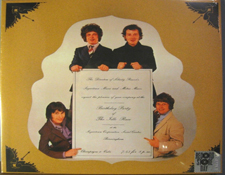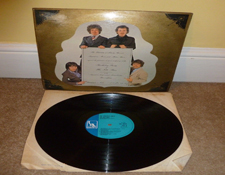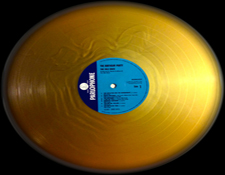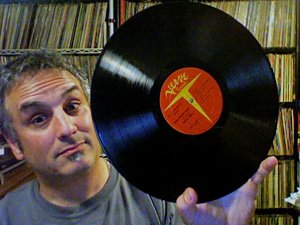It’s the time of year for saving money!
The album release I got most excited about on Record Store Day this year is a reissue of a long out of print record that is home to the first recordings by Jeff Lynne. For those not in the know, Jeff Lynne is the fellow who went on to co-found The Electric Light Orchestra in 1971 and then in the 1980s and 90s went on to become one of the most in demand and successful producers in pop music history.
 The name of his first band is The Idle Race and the album is called The Birthday Party. I have had this long out of print recording for a few years now on CD, having finally located a compilation of the band’s two albums (and non LP bonus tracks) on a decent two CD set put out by EMI in Europe.
The name of his first band is The Idle Race and the album is called The Birthday Party. I have had this long out of print recording for a few years now on CD, having finally located a compilation of the band’s two albums (and non LP bonus tracks) on a decent two CD set put out by EMI in Europe.
Did I tell you, by the way, that I’m a big big fan of ELO and Jeff Lynne and also The Move (the band Jeff joined, led by Roy Wood which led to the formation of ELO)? Yeah, so on some levels I acknowledge that this re-release is somewhat of a completist thing for hardcore obsessives. However, on another level, if you are simply a fan of mid-late 1960s British rock and pop psychedelia, well then this one may be good for you.
When I heard that they were putting out an LP reissue of the first Idle Race album on vinyl — gold vinyl at that! — for Record Store Day (1,000 copies or thereabouts) I was ecstatic. Accordingly, I am almost completely thrilled with the reissue. You see the CD did not even attempt to reproduce the original album artwork apart from some dubiously angled small photos in the booklet. So, to have the original cover art in any form is a big deal, especially since the album was never released in this form in the USA (not that that matters – I have never ever seen a copy of The Idle Race on vinyl in the States or overseas). The gold vinyl is a really nice touch, playing into the gold birthday invitation theme of the cover art. The pressing is dead quiet and features (from what I can tell) a period accurate reproduction of the sort of aqua colored label Liberty Records was doing in the swinging mid-60s London (the reissue puts current parent brand name Parlophone in place of the Liberty logo).
 How does it sound? Well, you know what? It sounds real good — after all, one of the producers on this albums was a young Eddie Offord who went on to international acclaim producing bands like Yes and ELP. For the time period, the album sounds excellent even. This reissue sounds fairly similar to the above mentioned CD, but the LP gets a significant nod of sonic improvement for warmth and presence, particularly on the high end and mid ranges. That said, I am not going to make any further judgement calls on the sound of this record as I have thus far found no information on the source of either version. Also, given that I have never even SEEN an original UK pressing, much less heard one, I am in no position to tell you whether one sounds better than an original or not.
How does it sound? Well, you know what? It sounds real good — after all, one of the producers on this albums was a young Eddie Offord who went on to international acclaim producing bands like Yes and ELP. For the time period, the album sounds excellent even. This reissue sounds fairly similar to the above mentioned CD, but the LP gets a significant nod of sonic improvement for warmth and presence, particularly on the high end and mid ranges. That said, I am not going to make any further judgement calls on the sound of this record as I have thus far found no information on the source of either version. Also, given that I have never even SEEN an original UK pressing, much less heard one, I am in no position to tell you whether one sounds better than an original or not.
As my one of my friends down in LA says all the time: “it is what it is.”
More significantly, I will say this about the LP: I prefer listening to this recording on vinyl due to the two-sided form factor. The Birthday Party album was designed very much like Sgt. Pepper in that there is a distinct sense of Side One and Side Two and it presents something of a faux Vaudeville flavored “It’s Showtime!” kind of feel. On the CD the tracks just run together and you lose that sense of theatricality. For example, side two begins with a bit called “On With the Show” and ends with “End of the Road,” so having that sort of definition of start and finish — enabled by the listener having to physically get up and flip the disc over — is really appealing.
What are the songs like? As you might expect they are heavily influenced by The Beatles (and to an extent, The Kinks). The really interesting thing is that so many of the sonic signatures that became almost trademark sounds of Jeff Lynne’s later productions are remarkably present on this album. Some tracks sound almost like they could have been on ELO albums with string sections soaring, cellos chiming, McCartney-esque bass lines rollicking, wirey-single string lead guitar lines mirroring vocals, layered-up harmonies choir-ing celestially and more.
 It is an impressive debut! So impressive that I can now fully understand
It is an impressive debut! So impressive that I can now fully understand
(a) why Jeff eventually joined up with Roy Wood in The Move and ELO after The Idle Race records failed to chart (despite significant push from the labels and much critical acclaim)
(b) why Roy Wood eventually left ELO once it was formed — so many of the orchestral ideas that I once assumed were Roy’s are now (to my ear) skewing toward Jeff’s influence, thus explaining how ELO could continue so successfully after Roy departed.
(c) how Jeff could make it into the inner sanctum (if you will) to rock royalty that would enable him to produce recordings for various and sundry Beatles — it wasn’t just that ELO was a super success in the 1970s and 80s that made him appealing… it likely had as much to do with the fact that Jeff was there and a part of that scene in the mid-60s, a known and respected entity from way back when and thus familiar and safe to the remaining fabs, not some outsider.
I love it when puzzle pieces start to fit together….
My favorite songs on this album thus far range from the very British 60s sounding “I Like My Toys” to the pulsing “Morning Sunshine” which could have easily been on The Move’s 1971 release Message From The Country or perhaps even ELO”s New World Record. Really, while this effect was perhaps an early Mellotron (speculating here), the type of sound he achieves aims for that sort of synthy-telephone / communications-y / proto-computer-y type sound Lynne years later on songs like “Telephone Line.”
“Follow me, Follow” could have been a really nice single. “Lucky Man” could have easily been a track on The Traveling Wilbury’s records with its strummy acoustic guitar based verses and catchy hooky choruses and vibrato guitar parts. “Lucky Man” is perhaps the great grandfather of Mr. Blue Sky (from ELO’s “Out of the Blue”) with its pulsing A Day In The Life bridge-beat (you know the part, where Paul comes in an sings “woke up, got out of bed, dragged the comb across my head…”). “Mrs.Ward” is a bit of a nod to The Kinks “Autumn Almanac” and “Dead End Street,” sung in a very almost cliche British accent.
One of the cooler tracks on the album was not written or sung by Jeff Lynne, the punchy “Pie In The Sky.” Written (and I assume sung) by band member Dave Pritchard, it is a fun tune replete with electric sitar, multi-part harmonies and a key change at the end. Great pop, almost like a very English twist on The Association.
I could go on but I think you get the idea that this is a pretty remarkable album that has been unjustly ignored over the years and really holds an important place in the history of British rock and pop music.
If you are a fan of ELO, Jeff Lynne and The Move, you should definitely pick this up. It’s a keeper.
Mark Smotroff is a freelance writer and avid music collector who has worked for many years in marketing communications for the consumer electronics, pro audio and video games industries, serving clients including
DTS, Sega, Sony, Sharp, AT&T and many others. www.smotroff.com Mark has written for EQ Magazine, Mix Magazine, Goldmine/DISCoveries Magazine, BigPictureBigSound.com, Sound+Vision Magazine and HomeTechTell.com. He is also a musician / composer whose songs have been used in TV shows such as Smallville and Men In Trees as well as films and documentaries. www.ingdom.com Mark is currently rolling out a new musical he’s written: www.dialthemusical.com.






